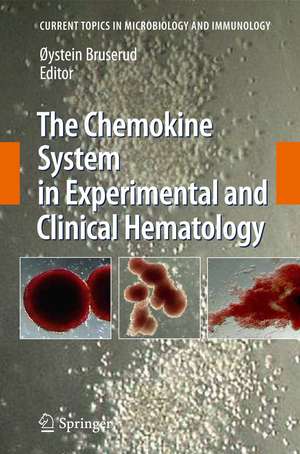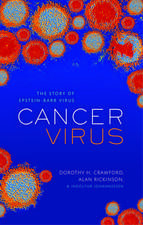The Chemokine System in Experimental and Clinical Hematology: Current Topics in Microbiology and Immunology, cartea 341
Editat de Oystein Bruseruden Limba Engleză Paperback – 13 oct 2012
| Toate formatele și edițiile | Preț | Express |
|---|---|---|
| Paperback (1) | 1090.04 lei 6-8 săpt. | |
| Springer Berlin, Heidelberg – 13 oct 2012 | 1090.04 lei 6-8 săpt. | |
| Hardback (1) | 981.70 lei 38-44 zile | |
| Springer Berlin, Heidelberg – 30 aug 2010 | 981.70 lei 38-44 zile |
Din seria Current Topics in Microbiology and Immunology
- 18%
 Preț: 962.03 lei
Preț: 962.03 lei - 5%
 Preț: 1123.13 lei
Preț: 1123.13 lei - 5%
 Preț: 1085.92 lei
Preț: 1085.92 lei -
 Preț: 499.76 lei
Preț: 499.76 lei - 5%
 Preț: 967.79 lei
Preț: 967.79 lei - 18%
 Preț: 1118.62 lei
Preț: 1118.62 lei - 5%
 Preț: 717.00 lei
Preț: 717.00 lei - 5%
 Preț: 712.97 lei
Preț: 712.97 lei - 5%
 Preț: 709.51 lei
Preț: 709.51 lei - 5%
 Preț: 709.51 lei
Preț: 709.51 lei - 5%
 Preț: 721.19 lei
Preț: 721.19 lei - 5%
 Preț: 359.78 lei
Preț: 359.78 lei - 5%
 Preț: 711.88 lei
Preț: 711.88 lei - 5%
 Preț: 774.81 lei
Preț: 774.81 lei - 15%
 Preț: 640.06 lei
Preț: 640.06 lei - 5%
 Preț: 717.00 lei
Preț: 717.00 lei - 5%
 Preț: 360.34 lei
Preț: 360.34 lei - 5%
 Preț: 707.69 lei
Preț: 707.69 lei - 5%
 Preț: 717.56 lei
Preț: 717.56 lei - 5%
 Preț: 716.28 lei
Preț: 716.28 lei - 5%
 Preț: 717.20 lei
Preț: 717.20 lei - 5%
 Preț: 711.32 lei
Preț: 711.32 lei - 5%
 Preț: 711.88 lei
Preț: 711.88 lei - 5%
 Preț: 718.29 lei
Preț: 718.29 lei - 5%
 Preț: 709.51 lei
Preț: 709.51 lei - 5%
 Preț: 369.84 lei
Preț: 369.84 lei - 5%
 Preț: 712.25 lei
Preț: 712.25 lei - 5%
 Preț: 716.45 lei
Preț: 716.45 lei - 5%
 Preț: 706.60 lei
Preț: 706.60 lei - 5%
 Preț: 711.52 lei
Preț: 711.52 lei - 5%
 Preț: 713.54 lei
Preț: 713.54 lei - 5%
 Preț: 720.47 lei
Preț: 720.47 lei - 5%
 Preț: 725.42 lei
Preț: 725.42 lei - 5%
 Preț: 708.06 lei
Preț: 708.06 lei - 5%
 Preț: 713.70 lei
Preț: 713.70 lei - 5%
 Preț: 705.83 lei
Preț: 705.83 lei - 5%
 Preț: 710.96 lei
Preț: 710.96 lei - 5%
 Preț: 723.93 lei
Preț: 723.93 lei - 5%
 Preț: 707.69 lei
Preț: 707.69 lei - 5%
 Preț: 715.35 lei
Preț: 715.35 lei - 5%
 Preț: 709.87 lei
Preț: 709.87 lei - 5%
 Preț: 359.05 lei
Preț: 359.05 lei - 5%
 Preț: 374.20 lei
Preț: 374.20 lei - 15%
 Preț: 635.31 lei
Preț: 635.31 lei - 5%
 Preț: 707.86 lei
Preț: 707.86 lei - 5%
 Preț: 721.96 lei
Preț: 721.96 lei - 15%
 Preț: 632.88 lei
Preț: 632.88 lei - 15%
 Preț: 632.05 lei
Preț: 632.05 lei - 15%
 Preț: 642.83 lei
Preț: 642.83 lei
Preț: 1090.04 lei
Preț vechi: 1147.41 lei
-5% Nou
Puncte Express: 1635
Preț estimativ în valută:
208.57€ • 217.77$ • 172.63£
208.57€ • 217.77$ • 172.63£
Carte tipărită la comandă
Livrare economică 05-19 aprilie
Preluare comenzi: 021 569.72.76
Specificații
ISBN-13: 9783642264658
ISBN-10: 3642264654
Pagini: 220
Ilustrații: XII, 208 p.
Dimensiuni: 155 x 235 x 12 mm
Greutate: 0.31 kg
Ediția:2010
Editura: Springer Berlin, Heidelberg
Colecția Springer
Seria Current Topics in Microbiology and Immunology
Locul publicării:Berlin, Heidelberg, Germany
ISBN-10: 3642264654
Pagini: 220
Ilustrații: XII, 208 p.
Dimensiuni: 155 x 235 x 12 mm
Greutate: 0.31 kg
Ediția:2010
Editura: Springer Berlin, Heidelberg
Colecția Springer
Seria Current Topics in Microbiology and Immunology
Locul publicării:Berlin, Heidelberg, Germany
Public țintă
ResearchCuprins
The Chemokine System in Experimental and Clinical Hematology.- Chemokine Decoy Receptors: Structure–Function and Biological Properties.- Role of Chemokines in the Biology of Natural Killer Cells.- Chemokines in Angiogenesis.- Genetic Polymorphisms in the Cytokine and Chemokine System: Their Possible Importance in Allogeneic Stem Cell Transplantation.- The Chemokine System: A Possible Therapeutic Target in Acute Graft Versus Host Disease.- Homing in on Acute Graft vs. Host Disease: Tissue-Specific T Regulatory and Th17 Cells.- The Chemokine Network in Acute Myelogenous Leukemia: Molecular Mechanisms Involved in Leukemogenesis and Therapeutic Implications.- CXCR4 in Clinical Hematology.- Immunobiology of Heparin-Induced Thrombocytopenia.
Textul de pe ultima copertă
The aim of the issue is to describe and explain the importance of the chemokine system in hematology. As described in the introduction the chemokine system is probably important for many aspects of normal as well as malignant hematopoiesis. A major focus is the development and treatment of hematologic malignancies, including the immunobiology of stem cell transplantation.”The present reviews illustrate that chemokines can be involved in leukemogenesis. The chemokine system is also important both for the crosstalk between malignant cells and their neighbouring nonmalignant stromal cells (including endothelial cells) as well as for immunoregulation in patients treated with allogeneic stem cell transplantation. Thus, chemokines are important both for the pathogenesis and treatment of hematological diseases.
Caracteristici
The aim of the issue is to describe and explain the importance of the chemokine system in hematology The chemokine system is probably important for many aspects of normal as well as malignant hematopoiesis A major focus is the development and treatment of hematologic malignancies, including the immunobiology of stem cell transplantation Includes supplementary material: sn.pub/extras









